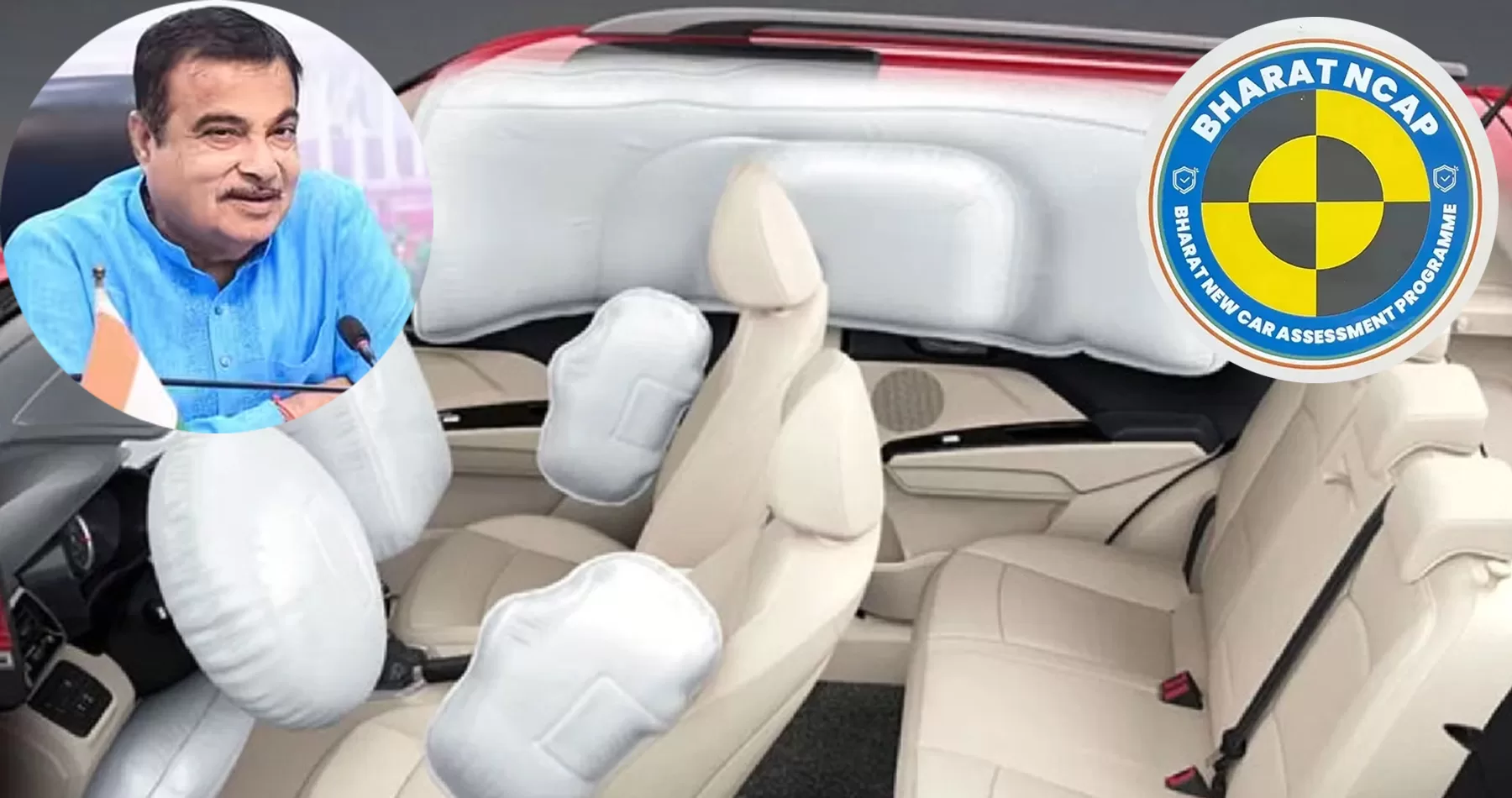The Indian government has announced that cars must be equipped with six airbags in order to receive a coveted 5-star crash rating from the Bharat New Car Assessment Programme (NCAP). This historic announcement was made by Union Minister Nitin Gadkari at the 63rd annual convention of the Automotive Component Manufacturers Association of India (ACMA). This decision represents a significant advancement in ensuring the safety of Indian motorists and passengers on the country’s roads.
6 Airbags to be Mandatory for Cars to get 5-Star Rating at BNCAP – N. Gadkari, Details
The Drive Towards Safer Roads
The statement made by Nitin Gadkari at the ACMA convention demonstrates the government’s unwavering commitment to improving road safety in India. With the country’s expanding automobile industry and rising vehicle ownership, safety concerns have taken center stage. The decision to require six airbags for a 5-star crash rating is a proactive step toward addressing these concerns.
A Transformative Impact on Car Manufacturing
Gadkari’s announcement is hugely important for car manufacturers in India. Vehicles seeking a 5-star rating must be equipped with a comprehensive airbag system that includes six airbags, according to the new crash test rules. This mandate ensures that safety features are not just an option for cars seeking the highest safety ratings, but a fundamental requirement.
Why 6 Airbags Matter
Airbags play a crucial role in mitigating the impact of a collision on vehicle occupants. By providing cushioning and reducing the force of impact during a crash, airbags can significantly reduce the risk of injury and save lives. The decision to make six airbags mandatory aligns with global safety standards and acknowledges the critical role of these safety systems in safeguarding lives.
The Path to Safer Roads
The introduction of this mandate is expected to have a cascading effect on the automotive industry. Car manufacturers will now be compelled to prioritize safety features in their vehicle designs. As a result, consumers can expect a broader range of vehicles equipped with advanced safety technology, including six airbags.
Implications for Car Buyers
For consumers, this announcement signifies a positive shift towards safer vehicle choices. With six airbags becoming the norm for 5-star rated cars, buyers can have greater confidence in the safety of their vehicles. It is essential to note that these safety enhancements may lead to slight increases in car prices. However, the added safety features are a worthwhile investment in protecting the lives of drivers, passengers, and pedestrians.
The Global Benchmark
The announcement by Gadkari brings India closer to global safety standards and practices. Vehicles in countries with strict safety regulations, including airbag systems, are frequently required to meet stringent safety criteria. India’s decision to adopt such standards demonstrates its dedication to ensuring the well-being of its citizens.
The Road Ahead
More safety-related initiatives are expected to follow as India continues its journey toward safer roads. Road safety awareness campaigns, strict traffic regulations, and advanced safety features are all part of a comprehensive strategy to reduce traffic accidents and fatalities.
Conclusion
The announcement by Nitin Gadkari mandating six airbags for a 5-star crash rating is a game changer in terms of ensuring safer roads in India. This move not only raises the bar for car manufacturers but also gives car buyers confidence in the safety of their vehicles. As the country moves toward improved road safety, it is critical that all stakeholders – government, manufacturers, and consumers – work together to create a safer driving environment for all. This mandate is more than just a requirement; it is a pledge to save lives on India’s roads.
READ MORE :
- All About Aston Martin Cars
- Audi e tron Review
- Bently Continental GT price in India
- BMW X1 Price in India
- Brezza 2022 Launch date in India
- Why Bugatti Is So Expensive?
- Best car dealers in Dubai
- Concorde Motors Kochi
- Honda Showroom Kochi
- Indus Motors Thevara
- KIA DEALERS IN PUNE
- Lamborgini Showroom in India
- Nippon Toyota Kalamassery
- Rolls Royce Showroom in India
- Sai Service Pathadipalam
- Top 10 Car Showrooms Kottayam,
- Top 5 Car Showrooms Trivandrum
- BREZZA 2022 vs TATA NEXON
- Citroen C3 price in India
- 2021 Chevrolet corvette vs Mustang Shelby GT50
- Is Mercedes-Benz better than BMW?
- EcoSport Price in Kerala
- Upcoming Ford cars in India –
- Alcazar
- Cars price in India
- Hyundai Creta
- i20 Price in Kerala on-road
- venue price in India
- KIA Carens price in India on road
- Carnival 2021 India
- KIA Cars on road price in India
- seltos price in Kerala
- Kia sonet price in Kerala
- Landrover Range rover Evoque review
- Mahindra Bolero Neo
